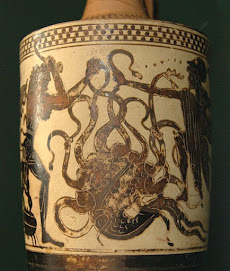The story of Herakles, if we are to accept part of the myth as at least metaphor, has always realized one profound thing for me in my life as a Hellenist. That is, the ideal that there is nothing you cannot come back from, nothing which you cannot make amends for and be a better version of yourself.
In at least one version of the myth that we are today familiar with, Herakles, in a fit of rage, killed His entire family, meaning wife and children. Now we don't know if that was literal or a metaphor to describe the severity of an offense. We should also take into consideration the fact that Herakles was probably a military veteran who could have suffered from PTSD, and didn't hurt innocent people out of His own free will.
But not even the worst crime man could commit meant that He was beyond redemption. The 12 Labors were His opportunity. They were near impossible feats, extremely dangerous, and probably expected to kill Him at some point. But if able to succeed, all of Herakles' crimes would be pardoned. He reached this goal, and was not only exonerated, but made a God, Zeus' own son. In ancient Greek religion, Herakles is worshiped as both a Hero and a God, and is actually considered to be the God of Heroes themselves. Quite an elevation from where He began in life.
When looking at my own shortcomings and mistakes in life, I often think about this story, and say to myself, What I have done isn't even remotely comparable. I know there's a way to put it all behind me. The life, tragedy and triumph of Herakles is not merely mythology. It's an affirmation of hope for all of humankind. There is nothing you cannot come back from, nothing which the Gods are not willing to help you with. You need only pick up your sword and start marching.
Are you determined to kill the monsters? Do you desire to find the universal keys? Can you discover how to tame the wild beasts? And are you willing to even face death if it means you might survive free and accomplished? No matter what's in your past, if you wake up tomorrow and make yourself determined to fight any enemy, endure any pain, and face any fear to become a new person, the Gods will notice you.
In the Goodness of the Gods,
I'll see you at the next Herm down the road,
Chris Aldridge.


